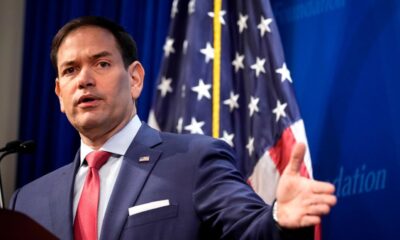Diaspora
Reps Probe N1.5bn Allegedly Diverted By Women Affairs Ministry

The House of Representatives Committee on Women Affairs has summoned the Minister of Women Affairs, Uju Kennedy-Ohaneye, to appear before it on Tuesday over the alleged diversion of N1.5 billion meant for the payment of contractors by principal officers of the ministry.
The development comes as contractors of the ministry petitioned the House of Representatives over the non-payment of contracts executed, running into billions of naira. The House Committee on Women Affairs has consequently commenced a probe into the alleged diversion of funds.
Director of Finance of the ministry, Aloy Ifeakandu, during an interactive session with the committee, said he complied with official directives from his superiors, saying the records are available. The session followed a petition by contractors of the ministry to the House of Representatives over the non-payment of contracts executed, running into billions of naira.
Chairman of the committee, Hon. Kafilat Ogbara, said that the ministry initiated new contracts that were not captured in the 2023 budget and diverted N1.5 billion funds meant for old contractors. She added that the ministry, while owing contractors, awarded fresh contracts in 15 states of the federation, which were not
captured in the 2023 appropriation.
She said there is an ongoing probe of the ministry by the Independent Corrupt Practices Commission (ICPC) and other Related Offences on the overhead release of Nov/Dec 2023 to the tune of N1.5 billion. The petitioners, according to Ogbara, also alleged that the ministry purchased 7 tricycles for a military barrack in Abuja, an allegation that the ministry procurement denied.
The committee noted that the ministry signed a memorandum of understanding (MoU) with the American University of Nigeria, Yola, for the payment of Chibok girls’ school fees for seven years. Responding to some of the allegations, the Permanent Secretary of the ministry, Ambassador Gabriel Aduda, said: “In 2023, we had a total budget of N13.6 billion, but the total release was N3.4 billion, translating to 25 per cent, budget utilisation was N3.4 billion, while the unreleased balance stood at N10.2 billion.”
“I resumed at the ministry in September 2023, I wouldn’t know what happened before I came. “The individual contractors have their files, it can be traced. As at the time I took over, there was no balance in the vote,” he said. Correspondence from the office of the Accountant General of the federation revealed that the sum of N1.5 billion has been released to the ministry.
“Since the minister came on board, no payment has been made, the permanent secretary said the minister ordered him not to pay any contractor,” the petitioners said. The Committee gave the ministry till Tuesday to tender all valuable documents and also ordered the ministry to stop all contract processes in 2024 until the matter is resolved while demanding a special account for the Chibok girls and the MoU
Diaspora
Diaspora Watch Vol. 63

Diaspora Watch Unveils 63rd Edition: A Global Mirror of Power, Politics and People
Diaspora Watch Vol. 63 FREE Digital View: https://diasporawatch.com/3d-flip-book/diaspora-watch-vol-63/
On Demand Print: https://www.magcloud.com/browse/issue/3172875?__r=1069759
Subscribe to Diaspora Watch Now on the link below!!!
https://diasporawatch.com/subscribe-to-diaspora-watch-newspaper/
The 63rd edition of Diaspora Watch Newspapers has hit the stands this week, bringing readers a compelling mix of global power plays, continental shifts, economic pursuits and cultural flashpoints.
From New York to Niamey, London to Lagos, the edition offers a panoramic view of unfolding events shaping the world and Africa’s place within it.
On the cover, U.S. politics takes centre stage as President Donald Trump, addressing the United Nations, boldly declares: “No President Has Done What I’ve Done.” In a dramatic twist on African geopolitics, Burkina Faso, Mali and Niger jointly announce their withdrawal from the International Criminal Court, condemning it as a “neo-colonial tool.”
Kenya’s President turns to America’s corporate giants, assuring investors of stability in a pitch to attract capital inflows. Nigeria equally seizes the moment, with the NNPC outlining ambitious upstream oil and gas expansion plans targeting $60 billion in investment. Across the Caribbean, CARICOM leaders rally at the UNGA 80, pressing hard for climate justice and a development agenda that cannot be ignored.
Europe is not left out of the storm: the Welsh First Minister pointedly shuns Trump’s banquet, fueling political ripples back home, while in Africa, Cameroon’s political dynasty faces unusual pressure as President Biya’s daughter openly calls on citizens to reject her father’s re-election bid. Elsewhere, Albania breaks new ground with the appointment of an AI “Minister” to combat corruption in public procurement — a move being hailed as futuristic governance.
On the health front, the World Health Organization issues a sobering warning, noting that slowing progress on non-communicable diseases and mental health is putting millions at risk globally.
Sports enthusiasts will find gripping drama on the back page, where Manchester United’s crisis-hit boss lays down the gauntlet with a blunt declaration: “My way or no way.”
Diaspora
Diaspora Watch Vol. 62

Diaspora Watch 62nd Edition Is Here!
Diaspora Watch FREE Digital View: https://diasporawatch.com/3d-flip-book/diaspora-watch-vol-62/
On Demand Print: https://www.magcloud.com/browse/issue/3172869?__r=1069759
Subscribe to Diaspora Watch Now on the link below!!!
https://diasporawatch.com/subscribe-to-diaspora-watch-newspaper/
The 62nd edition of Diaspora Watch Newspapers is out, delivering a hard-hitting blend of global politics, African affairs, diplomacy, business, health, and culture, with stories that cut across continents and shape conversations.
Leading the cover is a riveting headline from London, where Donald Trump’s UK visit takes a dramatic turn as he sidesteps the brewing Mandelson–Epstein controversy, raising eyebrows in diplomatic and media circles alike.
In the Middle East, Saudi authorities have freed three Nigerian pilgrims detained over alleged drug trafficking, bringing relief to families back home. On the domestic front, Labour Party’s Peter Obi lambasts President Tinubu over plans for emergency rule in Rivers State, stoking fresh political debates.
The global economy also takes centre stage: the United Kingdom secures a massive £150 billion U.S. investment as Prime Minister Keir Starmer and Donald Trump strike a landmark tech deal. Meanwhile, South Sudan is plunged deeper into crisis as President Salva Kiir suspends his deputy, Riek Machar, and accuses him of treason.
In Asia, U.S.-China tensions flare once again as Beijing slams Nvidia with monopoly breach accusations, just as both nations resume sensitive trade talks. Public health makes headlines with the World Health Organization’s grim report of a 50% surge in global cholera deaths. From Europe, Spain introduces disaster preparedness lessons for children, a move hailed as a pioneering approach to climate resilience.
The Caribbean bloc, CARICOM, issues a firm condemnation of Israel’s strike on Qatar, insisting on respect for international law. In the energy sector, the United States oil industry struggles as job losses mount and companies slash spending amid sliding prices.
On the cultural front, Hollywood dazzles as Brad Pitt and The Studio emerge dominant at the 2025 Emmy Awards, sealing their place in entertainment history.
With fearless reportage and bold editorial framing, Diaspora Watch continues to provide the diaspora community with sharp insights and global perspectives, reinforcing its position as the voice of Africans abroad and a trusted lens on world affairs.
The 62nd edition is available now in print and digital formats.
Diaspora
Diaspora Watch Vol. 56

Global Economic Shifts Dominate Diaspora Watch’s 56th Edition
The 56th edition of Diaspora Watch is out, and it’s packed with insightful analysis on the latest global economic trends.
Diaspora Watch FREE Digital View: https://diasporawatch.com/3d-flip-book/diaspora-watch-vol-56/
SUBSCRIBE TO DIASPORA WATCH NOW ON THE BELOW LINK !!!
https://diasporawatch.com/subscribe-to-diaspora-watch-newspaper/
This issue shines a spotlight on the US sanctions targeting firms across Asia and the Middle East over their links to Iran’s oil industry, sparking a ripple effect in the global energy market.
Meanwhile, Africa is making a strategic pivot towards China, capitalizing on the Asian giant’s economic prowess amidst US tariffs. This shift is poised to redefine Africa’s economic landscape and open up new opportunities for growth and development.
In other news, the 2025 ACTIF conference brought together key stakeholders, including Amb. Tochil Nwaneri, as the Africa and Caribbean regions signed $290 million worth of deals. This landmark agreement is set to bolster economic ties between the two regions and drive progress.
Japanese investors are also taking notice of Africa’s growth story, eyeing opportunities to tap into the continent’s vast potential.
However, the US fertility rate has plummeted to 1.6 kids per woman, raising concerns about the country’s demographic future.
On the faith front, Bishop Ogunedo urged the faithful to maintain firm faith in the Lord Jesus, emphasizing the importance of spiritual resilience in these uncertain times.
This edition of Diaspora Watch also highlights the NNPC’s assurance of speedy delivery of the $2.8 billion AKK gas pipeline project, Guyana’s new official residence for the CARICOM Secretary-General, and Tinubu’s conferment of national honors on the Super Falcons.
Stay informed with Diaspora Watch’s 56th edition, your premier source for global news and analysis.
Stay connected with the world around you – read Diaspora Watch today!
Celebrating African excellence and spotlighting pressing global issues.
#DiasporaWatch #AfricaInFocus #GlobalNews #CulturalVoices #AfricanPerspective
-

 News1 week ago
News1 week agoTrump, Mamdani Strike Conciliatory Tone After ‘Productive’ White House Meeting
-

 News1 week ago
News1 week agoKwara Church Attack: Police, DSS Arrest Suspected Bandits’ Armourer, Logistics Suppliers
-

 News1 week ago
News1 week ago‘Tremendous Progress’ in Ukraine Peace Talks as Trump Slams Kyiv Over ‘Ungratefulness’
-

 News3 days ago
News3 days agoInsecurity: US Spy Plane Begins Operations in Nigeria
-

 News1 week ago
News1 week agoNigeria Reels as 315 Pupils Abducted in Niger, 50 Escape
-

 News1 week ago
News1 week ago‘Genocide in Nigeria!’ Trump Roars, Threatens Action














